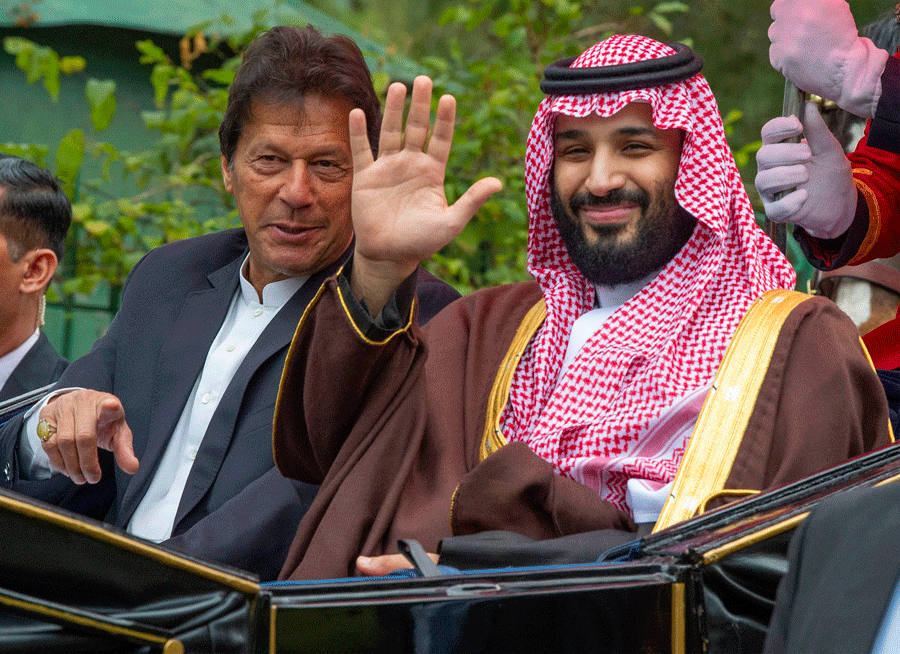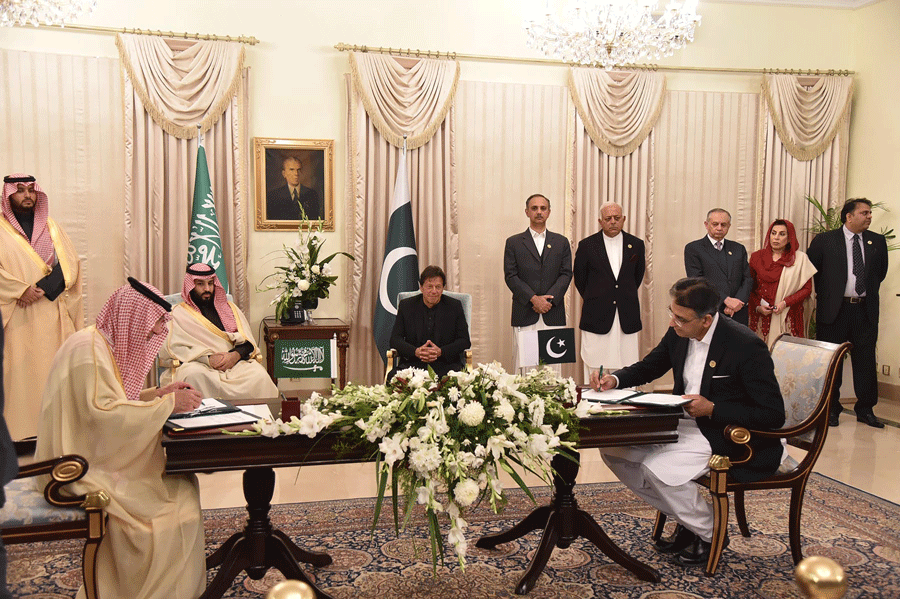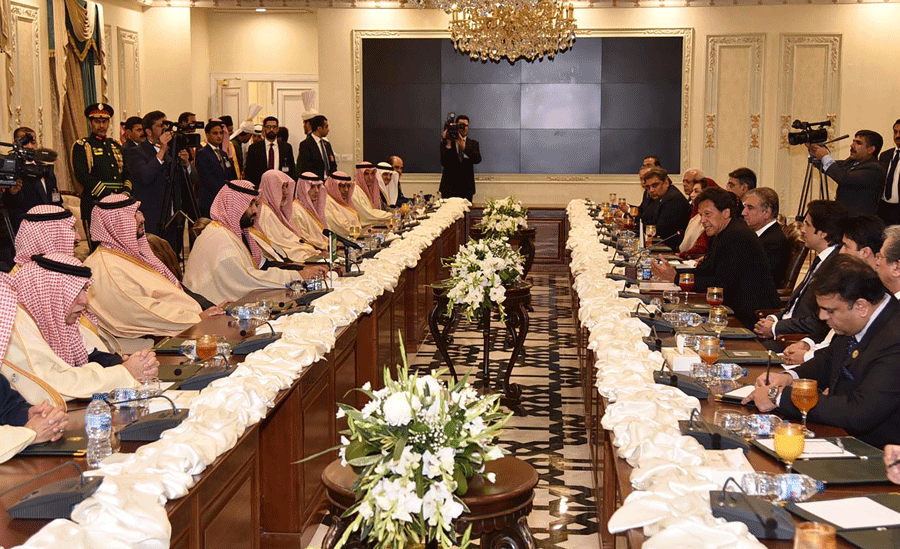The Price of Saudi Investment
By K. K. Shahid | Newsbeat National | Published 6 years ago

Enjoying the moment: PM Khan and MBS ride a carriage during a welcome ceremony in Islamabad.
Saudi Crown Prince, Mohammed bin Salman, landed in Islamabad on February 17 for a two-day visit. His stay in Pakistan was the first leg of his Asia tour, which also saw him visit India and China.
Mohammad bin Salman, popularly known as MBS, brought $20 billion in investments to Islamabad, spearheaded by a $10 billion oil refinery near Gwadar port. Memoranda of Understanding (MoUs), centering primarily around trade and energy, were also signed. The economic investment will help bolster Pakistan’s case as it seeks a 13th International Monetary Fund (IMF) bailout, while MoUs on energy will help address its multi-pronged energy crisis.
With the visit coming in the immediate aftermath of the Pulwama attack, MBS provided much-needed diplomatic support to Pakistan as well. While New Delhi pointed fingers at Islamabad over the February 14 suicide bombing that killed 40 security personnel in Indian-held Kashmir, MBS’s high profile visit quashed Indian talks of isolating Pakistan. More tangibly, the joint Saudi-Pakistan statement urged India to “avoid politicisation of the UN listing regime,” a clear reference to New Delhi’s calls to designate the Jaish-e-Mohammad (JeM) chief a ‘global terrorist’ at the United Nations, which China has been vetoing in recent years.
With Pakistan gaining financially and diplomatically, questions were posed over what Islamabad had promised Riyadh in return. Hints in that regard were provided in the days, even months, leading up to MBS’s Islamabad visit.
A delegation of the Islamic Military Counter Terrorism Coalition (IMCTC), led by former Army Chief General (retired) Raheel Sharif, arrived in Islamabad a week before MBS landed in Pakistan. Meetings pertaining to the regional security situation were held with the civil and military leadership.
Sources confirm that Pakistan has vowed increased military involvement in the IMCTC, which many feel is a Saudi-led coalition designed to counter Iranian influence in the region. The Saudi State Minister for Foreign Affairs, Adel bin Ahmed Al-Jubeir, dubbed Iran the “world’s chief sponsor of terrorism” in a joint press conference with his Pakistani counterpart, Shah Mehmood Qureshi, in Islamabad, much to the latter’s discomfort.
Islamabad was never expected to take a principled stance against Saudi human rights violations or indeed the killing of journalist Jamal Khashoggi, which had sparked protests during MBS’s visit to Tunisia. The killing also led to the Crown Prince being sidelined at the G20 conference held in Buenos Aires, Argentina, last November.
There are concerns that perhaps Islamabad is compromising too much in exchange for the substantial benefits that MBS has provided Pakistan. Former defence secretary, Lieutenant General (R) Asif Yaseen, however, does not think so. He believes that after dilly dallying over increasing military assistance to Saudi Arabia in the past, Pakistan has made the right call this time around.
“The visit [of MBS] wasn’t just important for Pakistan and Saudi Arabia, but held significance for the entire region,” says Yaseen. “Pakistan mishandled Saudi Arabia’s request for help in Yemen under the previous regime. The current leadership has fixed that, a lot of which is down to the Prime Minister.”

A friendship etched in ink and Saudi dollars: Delegates from both countries sign MoUs as PM Khan and MBS look on.
He adds that “There is a young leadership in Saudi Arabia now. After Shah Faisal, it’s Mohammad bin Salman who has brought a new vision. Pakistanis view Saudi Arabia in the religious context, as custodians of the Harmaein Sharifaein, while Saudis are aware of Pakistan’s political significance in the Muslim world, its geographical location, and its military strength, in particular,” he added.
Riyadh has historically bailed out Islamabad financially in exchange for a share in that military strength. Even before MBS’s visit to Islamabad, Saudi Arabia gave Pakistan a $6 billion bailout package in November.
Dr Abid Qaiyum Sulehri, Executive Director of the Sustainable Development Policy Institute (SDPI), maintains that the financial benefits Islamabad is getting from Riyadh will not reap immediate rewards. “The impact of Saudi investment won’t be immediate, it will take some time,” he says. “It takes around 18 months to create the feasibility of an oil refinery.
“If you look at the financial policy of the government, the first task was to address the balance of payment, then the ease of doing business, and the third component was investment – which they are now receiving,” continues Sulehri. “The benefits of the [Saudi] investment will be seen over the next two years or so.”
Former foreign minister Khurshid Kasuri lauds the structural changes being brought about in the aftermath of MBS’s visit. “A lot of MoUs signed in the past haven’t been implemented because of turf wars between different ministries in Islamabad,” he says. “Now, the coordination body, headed by PM Imran Khan and the Crown Prince, will ensure the execution of the MoUs.” He adds that “The next step is to facilitate private Pakistani investment. The Indian private sector is active in UAE and Saudi Arabia, and Pakistan’s private sector [needs to be similarly] active in those countries.”
Even so, with Pakistan formally joining the Saudi camp, there remain concerns about Islamabad sidelining neighbouring Tehran. There are also worries that the local Shia population, the second largest in the world, might feel alienated following Pakistan’s Saudi alignment.

Bringing high stakes to the table: PM Khan and MBS in a meeting at the Prime Minister‘s House in Islamabad.
Anti-Shia militant groups like the Lashkar-e-Jhangvi (LeJ) are still active in Balochistan. LeJ has allied itself with the Islamic State (IS) in the province. Meanwhile, Saudi Arabia is increasing its presence in Balochistan through the oil refinery in Gwadar.
There are calls that even if Saudi Arabia is given strategic and military cooperation in the Middle East, the oil refinery should not be allowed to become a shroud for the decades-old Saudi-Iran proxy jihad, the remnants of which are the IS and the LeJ in the region. A lot would depend on how Pakistan acts on its ties with Iran in the near future.
“Pakistan cannot be directly involved [in the Saudi war against Iran],” says senior political analyst Arif Nizami, the editor of Pakistan Today. “Islamabad can logistically and strategically provide its support, which will still get us investment. But we need to make sure we don’t compromise on our relations with Iran. Let’s not forget that Saudi Arabia has strong financial ties with India as well,” he adds.


